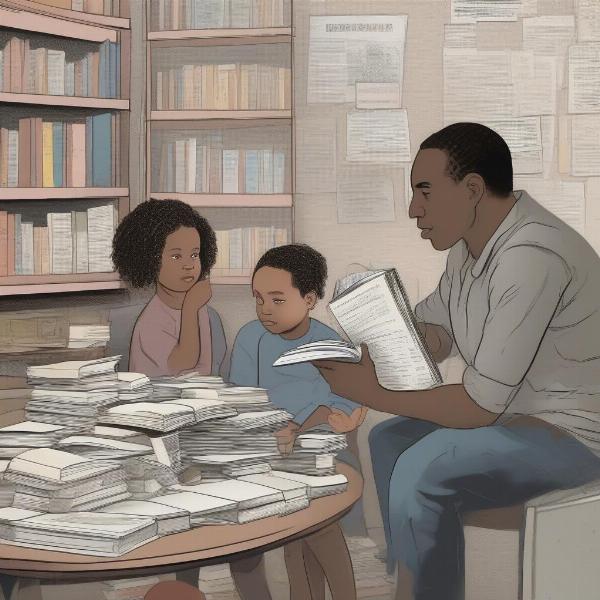Parents often ask, What Age Is The Hunger Games Book Suitable For? It’s a valid question given the mature themes present in the series. While the books are undeniably captivating with their thrilling plot and thought-provoking social commentary, navigating the appropriateness of its content for younger readers requires careful consideration.
This comprehensive guide will delve into the age recommendations for The Hunger Games, exploring the various factors influencing this decision, and providing parents and educators with the tools to determine if the series is a good fit for the young readers in their lives. We’ll cover violence, psychological themes, and other important elements to consider.
Understanding the Age Recommendations for The Hunger Games
The publisher generally recommends The Hunger Games trilogy for readers aged 12 and up. However, this is just a guideline, and the suitability ultimately depends on the individual child’s maturity level, reading comprehension skills, and ability to process complex themes. Some mature 11-year-olds might be ready for the series, while some 13-year-olds might find it too intense.
Violence and its Portrayal in The Hunger Games
One of the most significant concerns regarding The Hunger Games is its depiction of violence. The central premise of children fighting to the death in a televised spectacle is undeniably disturbing. While the violence isn’t gratuitously graphic, it’s realistically portrayed and emotionally impactful. This is a crucial aspect to consider when deciding if the book is appropriate for a particular child.
The Hunger Games doesn’t shy away from the consequences of violence, both physical and psychological. This can be beneficial for young readers as it promotes critical thinking about conflict and its impact, but it can also be overwhelming for sensitive or younger audiences. Consider discussing the violence with your child after they’ve read the book, to help them process the themes and develop a healthy understanding of conflict resolution.
Exploring the Complex Psychological Themes
Beyond the physical violence, The Hunger Games explores complex psychological themes such as survival, oppression, and the effects of trauma. These themes, while potentially challenging for younger readers, offer valuable opportunities for discussion and deeper understanding of the human condition. It’s important to gauge a child’s emotional maturity and ability to handle these themes before introducing them to the series.
Katniss Everdeen, the protagonist, faces immense psychological pressure as she navigates the Games and the complexities of the dystopian society she lives in. Her struggles with PTSD, moral dilemmas, and loss can be powerful teaching tools for young readers, fostering empathy and encouraging them to think critically about complex societal issues.
Is The Hunger Games suitable for a 10-year-old? While the recommended age is 12+, some mature 10-year-olds might be ready for the series. It really depends on the individual child. To help you decide if The Hunger Games is right for your child, consider their maturity level and reading comprehension.
Romance and Relationships in The Hunger Games
While not the primary focus, romance plays a role in The Hunger Games trilogy. The love triangle between Katniss, Peeta, and Gale adds another layer of complexity to the narrative. These relationships are explored within the context of the dystopian setting, offering insights into human connection and the challenges of love and loyalty in times of crisis. These romantic elements are generally appropriate for the target age group, but they can also spark discussions about healthy relationships and emotional dynamics.
Similar to how readers find value in understanding the reading level of The Hunger Games, the exploration of romantic relationships adds another dimension to the series’ appeal. To dive deeper into the suggested reading order of the series, you can check out our guide on how to read Hunger Games in order. This resource offers valuable insights for those eager to embark on the complete Hunger Games journey.
Making Informed Decisions: Parent and Educator Resources
There are numerous resources available to help parents and educators make informed decisions about introducing The Hunger Games to young readers. Reviews, online discussions, and educational guides can provide valuable insights into the series’ content and potential impact on different age groups. Talking to other parents, teachers, and librarians can also offer valuable perspectives. It’s crucial to consider all aspects of the series and the individual child’s maturity before making a decision.
 Resources for Parents Considering The Hunger Games
Resources for Parents Considering The Hunger Games
Beyond the Age: Discussing The Hunger Games with Young Readers
Even if a child is deemed ready for The Hunger Games, it’s essential to engage in discussions about the themes explored in the series. This open communication can help young readers process the complex issues and develop a deeper understanding of the story’s messages. Discussing the book also provides an opportunity to address any questions or concerns the child may have. This shared experience can be incredibly enriching for both the child and the adult.
The Hunger Games and Its Social Commentary
The Hunger Games isn’t just a thrilling adventure story; it also offers a powerful social commentary on issues such as inequality, oppression, and the abuse of power. These themes can spark important conversations with young readers about the world around them and encourage them to think critically about social justice.
Adapting to Different Maturity Levels
Recognizing that children mature at different rates, it’s crucial to consider individual needs and sensitivities. What might be suitable for one 12-year-old could be overwhelming for another. Open communication and careful observation are key to ensuring a positive reading experience.
Conclusion
Ultimately, deciding what age is The Hunger Games book suitable for is a matter of careful consideration and open communication. While the publisher’s recommendation provides a starting point, parents and educators should consider the individual child’s maturity level, reading comprehension, and ability to process complex themes. By engaging in thoughtful discussions and utilizing available resources, adults can help young readers navigate the challenges and reap the rewards of this captivating and thought-provoking series. So, what age is The Hunger Games book suitable for? The answer, as with most things related to parenting and education, is: it depends. But with careful consideration, you can make the right decision for the young reader in your life.
FAQ
-
What is the recommended age for reading The Hunger Games? The publisher recommends the series for ages 12 and up.
-
Why is The Hunger Games considered controversial for some young readers? The violence and mature themes can be challenging for some children.
-
What are some of the benefits of reading The Hunger Games? The series can spark discussions about important social issues and encourage critical thinking.
-
How can I help my child process the complex themes in The Hunger Games? Open communication and discussions are key to helping children understand and process the story’s messages.
-
Are there alternative books for younger readers who are interested in dystopian fiction? Yes, there are many other dystopian novels suitable for younger audiences, such as “The City of Ember.”
-
What are some resources for parents who are unsure if The Hunger Games is right for their child? Book reviews, online discussions, and educational guides can provide valuable insights.
-
How can I talk to my child about the violence in The Hunger Games? Focus on the consequences of violence and encourage empathy for the characters.

